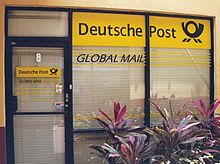
An international reply coupon (IRC) is a coupon that can be exchanged for one or more postage stamps representing the minimum postage for an unregistered priority airmail letter of up to twenty grams sent to another Universal Postal Union (UPU) member country. IRCs are accepted by all UPU member countries.
The Universal Postal Union, established by the Treaty of Bern of 1874, is a specialized agency of the United Nations (UN) that coordinates postal policies among member nations, in addition to the worldwide postal system. The UPU contains four bodies consisting of the Congress, the Council of Administration (CA), the Postal Operations Council (POC) and the International Bureau (IB). It also oversees the Telematics and Express Mail Service (EMS) cooperatives. Each member agrees to the same terms for conducting international postal duties. The UPU's headquarters are located in Bern, Switzerland.

The United States Postal Service (USPS), also known as the Post Office, U.S. Mail, or Postal Service, is an independent agency of the executive branch of the United States federal government responsible for providing postal service in the U.S., including its insular areas and associated states. It is one of the few government agencies explicitly authorized by the U.S. Constitution. The USPS, as of 2021, has 516,636 career employees and 136,531 non-career employees.
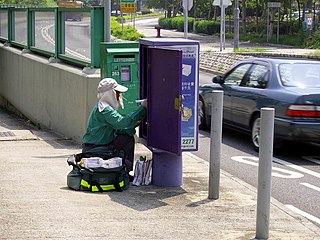
The mail or post is a system for physically transporting postcards, letters, and parcels. A postal service can be private or public, though many governments place restrictions on private systems. Since the mid-19th century, national postal systems have generally been established as a government monopoly, with a fee on the article prepaid. Proof of payment is usually in the form of an adhesive postage stamp, but a postage meter is also used for bulk mailing. With the advent of email, the retronym "snail mail" was coined.

The United States Post Office Department was the predecessor of the United States Postal Service, in the form of a Cabinet department, officially from 1872 to 1971. It was headed by the postmaster general.
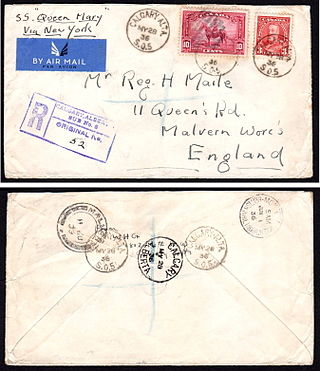
Registered mail is a mail service offered by postal services in many countries which allows the sender proof of mailing via a mailing receipt and, upon request, electronic verification that an article was delivered or that a delivery attempt was made. Depending on the country, additional services may also be available, such as:
Franking comprises all devices, markings, or combinations thereof ("franks") applied to mails of any class which qualifies them to be postally serviced. Types of franks include uncanceled and precanceled postage stamps, impressions applied via postage meter, official use "Penalty" franks, Business Reply Mail (BRM), and other permit Imprints (Indicia), manuscript and facsimile "franking privilege" signatures, "soldier's mail" markings, and any other forms authorized by the 192 postal administrations that are members of the Universal Postal Union.
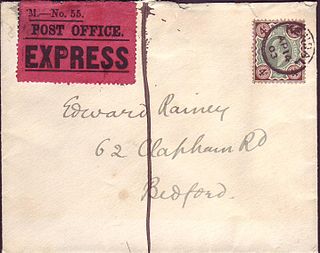
Express mail is an expedited mail delivery service for which the customer pays a premium for faster delivery. Express mail is a service for domestic and international mail, and is in most nations governed by the country's own postal administration. Since 1999, the international express delivery services are governed by the EMS Cooperative.

Parcel post is a postal service for mail that is too heavy for normal letter post. It is usually slower than letter post. The development of the parcel post is closely connected with the development of the railway network which enabled parcels to be carried in bulk, to a regular schedule and at economic prices. Today, many parcels also travel by road and international shipments may travel by sea or airmail.
A Digital Postmark (DPM) is a technology that applies a trusted time stamp issued by a postal operator to an electronic document, validates electronic signatures, and stores and archives all non-repudiation data needed to support a potential court challenge. It guarantees the certainty of date and time of the postmarking. This global standard was renamed the Electronic Postal Certification Mark (EPCM) in 2007 shortly after a new iteration of the technology was developed by Microsoft and Poste Italiane. The key addition to the traditional postmarking technology was integrity of the electronically postmarked item, meaning any kind of falsification and tampering will be easily and definitely detected. Additionally, content confidentiality is guaranteed since document certification is carried out without access or reading by the postal operator. The EPCM will eventually be available through the UPU to all international postal operators in the 191 member countries willing to be compliant with this standard, thus granting interoperability in certified communications between postal operators. In the United States, the US Postal Service operates a non-global standard called the Electronic Postmark, although it is soon expected to provide services utilizing the EPCM.
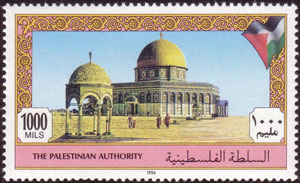
The Palestinian National Authority began in 1994 to issue stamps and operate postal services as authorized by the Oslo Accords.

Mobile post offices deliver mail and other postal services through specially equipped vehicles, such as trucks and trains.

The Postal Union Congress is the main international meeting of the Universal Postal Union, used to discuss various issues affecting international postal services, such as legislation, the political climate, and other strategic issues. The first congress was held in Bern, Switzerland in 1874, and was attended by delegates from 22 countries, most of them European. The meetings are normally held every four years, although they were cancelled during the two World Wars. Extraordinary Meetings can also be called outside the four-year cycle.

The Royal Gibraltar Post Office is the postal services in the British overseas territory of Gibraltar. It is currently a department within the Government of Gibraltar.

Bhutan Postal Corporation Ltd., or Bhutan Post, is the company in Bhutan responsible for the operation of the postal system.
The Barbados Postal Service (B.P.S.) is the national postal operator of Barbados and operates as a department within the Government of Barbados where it reports to the Ministry of Home Affairs. The Barbados Postal Service (B.P.S.) is headed by the acting Postmaster General, Sheila Greaves, who is responsible for maintaining the island’s postal services, subject to the laws of the island. In 1852, the Postal services for Barbados were reconstituted following the passage of local legislation enabling the delivery of inland postage.

A mail pouch or mailpouch is a container for mail, designed to transport first-class, registered mail, domestic mail and military mail. It usually has a drawstring, and is made of a stronger material than mail sacks and is designed to lock at the top with a mechanism system consisting of special closely spaced eyelets and a strong strap to secure the top where access into the bag is closed off and locked, where a mail sack does not have these features.
The Somali Postal Service is the national postal service of Somalia. It is part of the Federal Government of Somalia's Ministry of Communications and Technology.
